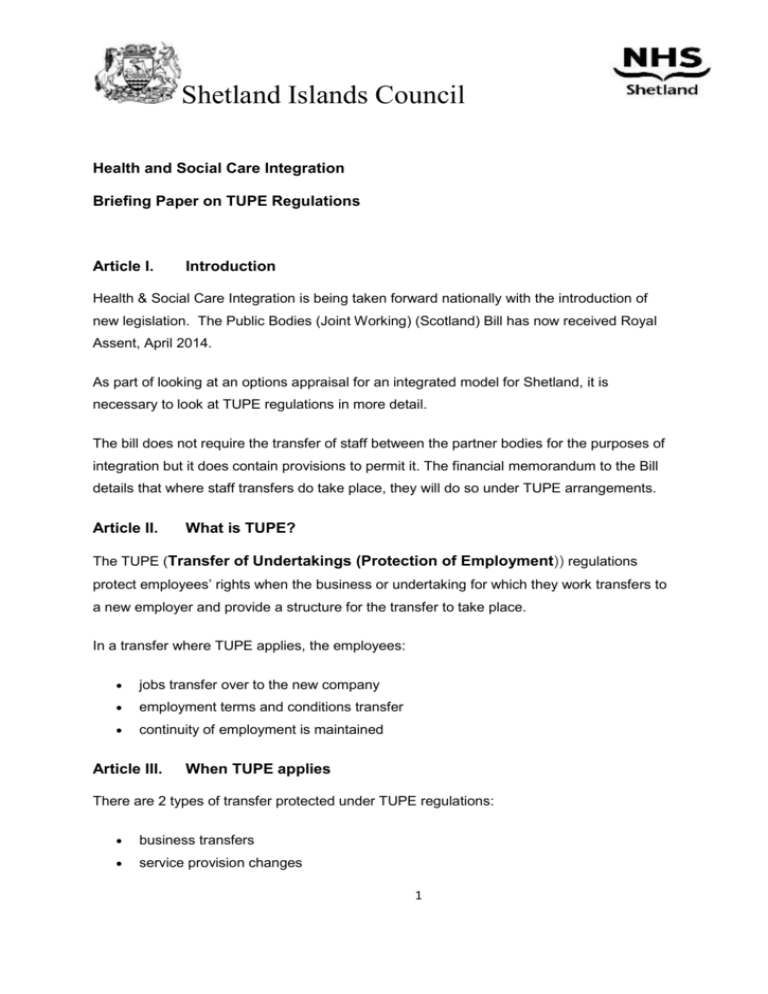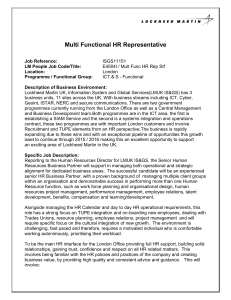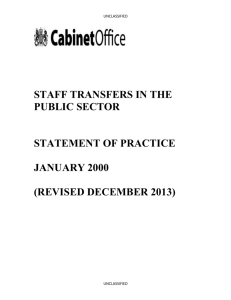Health and Social Care Integration
advertisement

Shetland Islands Council Health and Social Care Integration Briefing Paper on TUPE Regulations Article I. Introduction Health & Social Care Integration is being taken forward nationally with the introduction of new legislation. The Public Bodies (Joint Working) (Scotland) Bill has now received Royal Assent, April 2014. As part of looking at an options appraisal for an integrated model for Shetland, it is necessary to look at TUPE regulations in more detail. The bill does not require the transfer of staff between the partner bodies for the purposes of integration but it does contain provisions to permit it. The financial memorandum to the Bill details that where staff transfers do take place, they will do so under TUPE arrangements. Article II. What is TUPE? The TUPE (Transfer of Undertakings (Protection of Employment)) regulations protect employees’ rights when the business or undertaking for which they work transfers to a new employer and provide a structure for the transfer to take place. In a transfer where TUPE applies, the employees: jobs transfer over to the new company employment terms and conditions transfer continuity of employment is maintained Article III. When TUPE applies There are 2 types of transfer protected under TUPE regulations: business transfers service provision changes 1 Shetland Islands Council For the purpose of this briefing paper, business transfer only will be looked at in any detail, for this will be the only applicable transfer within the context of health and social care integration. At the time of writing no service provision changes were being proposed. Article IV. Business transfers This is where a business or part of a business moves from one employer to another. To be protected under TUPE during a business transfer, the identity of the employer must change. Therefore regardless of model chosen going forward for the integration of health and social care, TUPE can be applied for the transfer of health and social care staff, if that is the preferred option The TUPE Regulations were updated on 31 January 2014. All of the changes are related to the transfer of service provision changes only. (a) What happens to employees before and after the transfer? The regulations place a duty on both the outgoing and the incoming employers to inform and consult with trade unions/employee representatives regarding the transfer. This should be done long enough before the transfer to allow meaningful consultation. It should cover: That the transfer is going to take place When it is expected to happen Why the transfer will take place Any implications of the transfer on employees, such as working with a new team using a different IT system, And, any other actions the new employer might take such as any proposed redundancies or restructuring. During the consultation process the employer must consider any issues raised by the trade union/employee reps. 2 Shetland Islands Council Under TUPE, the new employer takes over employees’ employment contracts, including: all the previous terms and conditions of employment any failures of the previous employer to observe employees’ rights (so employees could make a claim for discrimination against the new employer, even if it took place before the transfer) holiday entitlement period of continuous employment - an employee’s start date is the same as before the transfer, so continuous employment isn’t broken any collective agreements previously made It’s a breach of contract if the new employer doesn’t meet the terms of the employment contract. Employees can refuse to work for the new employer. This is the same as resigning - they won’t normally be able to claim unfair dismissal or redundancy pay. Notice isn’t required. The employee simply tells the employer, or the new employer, before the transfer happens. Employment then ends at the time of the transfer. If an employee’s working conditions are significantly worse because of the transfer, they can object to the transfer, or resign and claim unfair dismissal. (b) Changing an employment contract TUPE regulations mean employees shouldn’t lose their existing employment rights. Before the transfer If the employer knows an employee is transferring to another company, they can’t normally change the employee’s terms and conditions to make them the same as those of the other company - even if the employee agrees to the change. 3 Shetland Islands Council After the transfer The new employer can’t change an employee’s terms and conditions if the reason is the transfer itself. The new employer can change an employee’s terms and conditions if the reason is an ‘economic, technical or organisational reason’ involving changes in the workforce (eg as a result of redundancies or a move from a managerial to a non-managerial position) and the employee agrees to the change. An employer can change an employee’s terms and conditions if the reason isn’t connected to the transfer. When the transfer is complete, employees should make sure they get an upto-date written statement of employment giving the name of the new employer and saying that their terms and conditions haven’t changed. Article V. Positive changes Employers can improve employees’ terms and conditions if they agree. For example, they might want to increase the amount of holiday so that it’s the same for everyone. An employer can’t normally impose changes - they have to be agreed by the employees or their representatives. Article VI. Collective agreements Collective agreements in place before the date of the transfer will apply. Collective agreements from the date of transfer won’t apply if the new employer hasn’t taken part in the process. Employers can renegotiate terms and conditions in collective agreements after 1 year if the change isn’t less favourable to the employee. Article VII. Pension rights Employees’ company pension rights earned up to the time of a transfer are protected, but the new employer doesn’t have to continue an identical pension. 4 Shetland Islands Council Financial Implications with each integration model, via TUPE Option 1 – Body Corporate; The Council and the Health Board would each delegate functions and resources to the Joint Board of the Body Corporate. Service delivery would be through the two statutory agencies with staff remaining with their current employer. The Joint Accountable Officer would be responsible for all service delivery and use of the delegated resources and would report to the Joint Board. Other resources e.g. capital assets would remain with the current owner. Financial Implication – £30,167,957 to be transferred to corporate body from NHS and SIC for Community Health and Social Care, if level and commissioned services were to remain the same. Option 2 – Delegation of functions for adult social care services by Shetland Islands Council to Shetland NHS Board The Council would delegate all community care services and any other functions/service areas as agreed to the Health Board. The Health Board and the Council would work in partnership through the Strategic Commissioning Group to produce the Strategic Plan. The Health Board as host partner would deliver all the services in the Strategic Plan including services on behalf of the Council as the delegating partner. Financial Implication – Salary costs and employee liability insurance costs to be transferred in the event of NHS being lead agency = £20,367,910.11 / (19%) of the total SIC budget. Option 3 – Delegation of functions for community health care for adults by Shetland NHS Board to Shetland Islands Council The Health Board would delegate all community health care services for adults and any other functions/service areas as agreed to the Council. The Health Board and the Council would work in partnership through the Strategic Commissioning Group to produce the Strategic Plan. The Council as host partner would deliver all the 5 Shetland Islands Council services in the Strategic Plan including services on behalf of the Health Board as the delegating partner. Financial Implication – Salary costs and employee liability insurance costs to be transferred in the event of SIC being lead agency = £9,800,047 /(37% of the total NHS budget) These costs are inclusive of holiday entitlement and any outstanding claims of discrimination from previous employers. 6 Shetland Islands Council Case study: TUPE in the Public sector The City of Edinburgh Council: Successful partnerships are those that value people1 Smooth transition When The City of Edinburgh Council formed a strategic partnership with BT in April 2001, people issues were top of the agenda. The fulfilment of the Council’s Smart City vision would need to see the smooth transition of 174 of its employees to BT. The success of the exercise is beyond doubt: as demonstrated in 2006 when the original 10-year award-winning partnership was extended to 15 years. Tom Aitchison, Chief Executive of The City of Edinburgh Council, says: “The contract extension has generated cost savings of over £22 million in ICT services. We have been able to reinvest that money, as a significant contribution to our keeping Council Tax frozen since the 2007/2008 financial year.” Invaluable expertise The scale of the information and communications technology (ICT) outsourcing agreement underpinning The City of Edinburgh Council Smart City is immense. It covers over 19,000 desktops, 46,000 email accounts, 150 business applications, 250 servers, more than 360 local area network sites, a city-wide metropolitan area network, internet access, intranet connectivity, and a hosted data centre. However, significant though that is, the Smart City ethos extends way beyond the provision of ICT shared services. The partnership is delivering large-scale business transformation projects in departments such as housing, revenue and benefits, children and families, finance, planning and building services, and education. Those initiatives are making a real difference to the lives of Council employees and citizens alike. 1 http://www.globalservices.bt.com/uk/en/casestudy/city_of_edinburgh_tupe 7 Shetland Islands Council Such innovation would simply not be possible without the invaluable knowledge and expertise of the ex-Council people now working within BT. Better service For BT, The City of Edinburgh Council partnership was one of its first major employee transition exercises. That valuable expertise has been hard won. Several of the people who transferred from The City of Edinburgh Council to BT in 2001, via TUPE, make reference to the fact that it initially took a little time for BT to benefit from their skills and attributes. Among these is Richard Milligan. Now Head of Service Operations for The City of Edinburgh Programme in BT, Richard relates: “BT was keen to dice up the service elements and deliver them as commodities. We helped to show it could be done more cost effectively by using the strength of the Edinburgh Programme team. That ethos has been successfully carried through into other local government contracts.” Michelle Browne, now Applications Support Manager in BT for The City of Edinburgh Council Programme, agrees. “After a short time BT quickly learned to use the experience of the staff it acquired.” John Grzybowski, Head of Service Introduction for BT Local Government Services and an ex-Edinburgh Council man, is of like mind. “I think BT eventually realised that, in the Council people who came across, it had acquired some truly valuable assets. Many of us grabbed the chance to extend and develop our expertise as opportunities arose,”. Transformation is key BT showed great empathy in using due diligence to build bridges. Richard Milligan says that Council people were involved in that process before the outsourcing contract got under way, which helped to demystify the experience. Stuart Anderson, Lead Programme Architect for BT in The City of Edinburgh Programme, is another ex-Council player. He adds: “During the due diligence exercise we worked collaboratively with BT, developing trust and relationships. This made the transition to BT very smooth, on day one we just continued working with the same familiar people.” 8 Shetland Islands Council Application of TUPE Turning to the personal dimensions, other powerful aspects of the story emerge. Under TUPE, people who transitioned to BT retained the majority of their City of Edinburgh Council terms and conditions including pay scales, annual pay rises, and flexitime. At a later date all the ex-Edinburgh staff were invited to transfer on a voluntary basis to a BT contract which included a system of annual bonuses. That suited many; but not all. George Davis, once System Administrator for The City of Edinburgh Council IT Service Desk and now a Service Design and Introduction Manager for major and significant projects, explains: “In my case age played a part in that decision. I decided to stay with my Council terms and conditions because I can see retirement on the horizon and wanted to remain with a contract suited to my personal circumstances. 9











